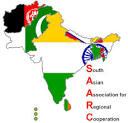
The SAARC leaders are planning to amend the SAARC Charter in order to modify the provisions that, at least theoretically, make the leader's summit an annual event. They say that is it not feasible nor is this needed. Instead they are proposing to have bi-annual leader's summits.
As s strong “federalist” I really hope that common sense will prevail and the SAARC Charter will not be amended.
I do understand the motivations that are pushing officials involved in the preparation of the summit to think about reducing the numbers of SAARC meetings. I do get their “common sense” about being practical and realistic. After all it has been a while since the latest summit held in the Maldives so their rationale for cutting down the annual meeting has certain logic and it is quite “sellable”.
All for all why should we bother with spending or wasting millions of dollars for an event that has to do more with formalities than concrete, tangible results?
We know that in terms of performance, SAARC, is one of the worst regional groupings despite the great potential and great similarities among its members.
The same exact reasons that explain the common sense for doing without the annual gathering are actually pushing me in the opposite direction. If we do care about regional integration and common sense for prosperity in South Asia, we should make a point with having one annual gathering of the leaders.
It is of outmost importance to hold firm on the principle that regional integration needs strong leadership at the top together with a vibrant pan regional civil society working at the grassroots.
Both dimensions need each other; political leaders must learn to trust one another and overcome the common biases and misunderstanding that oftentimes have blocked advances in bilateral cooperation within the member countries.
Governments leaders must have a certain degree of familiarity among them and therefore it is equally important that they also develop, gradually, personal relationships.
In short they must be comfortable to work as a team, let’s call it Team South Asia. They must craft the art, often based on compromise, of creating a common narrative, strengthening the rationale for working together towards a commonly shared sense of indispensability.
Without being together, our peoples will not prosper.
All this is possible only and if they have opportunities to work together, to meet and discuss among themselves.
Civil society at the regional level, on the other hand, must keep pressure on the leaders, providing an idealistic vision of a united region able to match the pragmatism that drives the decision making of the political leaders.
Indeed people to people relationships are indispensible to forge a new commitment towards a stronger SAARC and surely there is huge potential to do more in creating opportunities for interactions among the citizens of the member states. We should copy the Europeans with a regional student exchange programs, e.g., the south Asian version of Erasmus.
It is also important asking SAARC country citizens about the implications of regional integration. Not surprisingly they might not be interested nor be able to grasp its meaning and importance.
But if you reformulate the question to the citizens of India and Nepal living close to the open border shared by the two nations, the answer would be different.
The open border between India and Nepal is the greatest example of regional integration and leaders should aspire to make all the borders of the SAARC region as open as the borders dividing Nepal from India. Yes it is impractical and impossible but I guess that from many points of view the same open border shared by India and Nepal could be considered impractical and counterproductive, especially from the point of view of security.
Just imagine how long it took for EU countries to reach the Schengen Area of cooperation that pushed away the border controls among nations. It took decades of negotiations and important nations like UK are not even remotely thinking about joining.
For India and Nepal, the decision to have an open border was about a shared destiny, it was a political decision that required a huge amount of political capital.
That political capital was extremely well spent, with now the people of both countries cashing in a huge, immense, almost unimaginable “return”.
Imagine the massive economic impact generated by the open border between India and Nepal. Imagine how it positively changed the lives of people living along it. This created new relationships, new dynamics, playing a defining role in shaping the intensity of bilateral cooperation between the two countries. The open border is now indispensible. India and Nepal are indispensible to each other.
Yes indispensability. This is what the SAARC region needs. Leaders needs to have a bold vision, they must muster foresight to lay the building blocks of a commonly shared prosperity.
The masses might not understand the sense of urgency that the region is facing but they will surely appreciate the benefits of more regional cooperation.
The project like in EU might be criticized for being “elitist” but if we care about reducing poverty and developing our nations, we need to steer ahead the path of regional integration, even at the cost of spending millions of dollar to organize the annual SAARC gatherings.
The regional non-state actors should provide the leaders with a sketch of narrative for a more united South Asia. The vision for a stronger SAARC will slowly emerge, step by step, through partnerships.










Add new comment